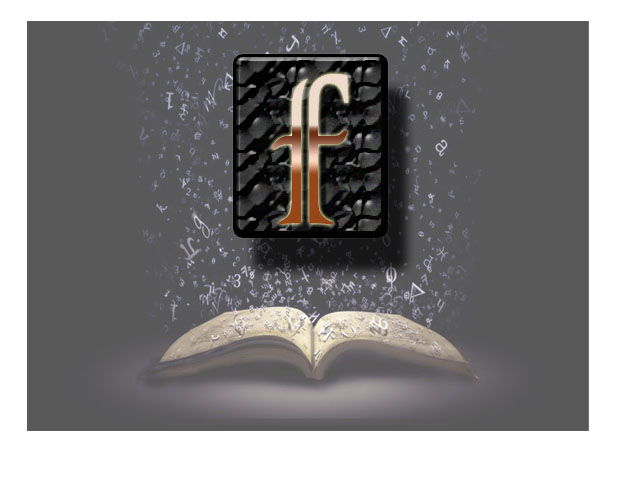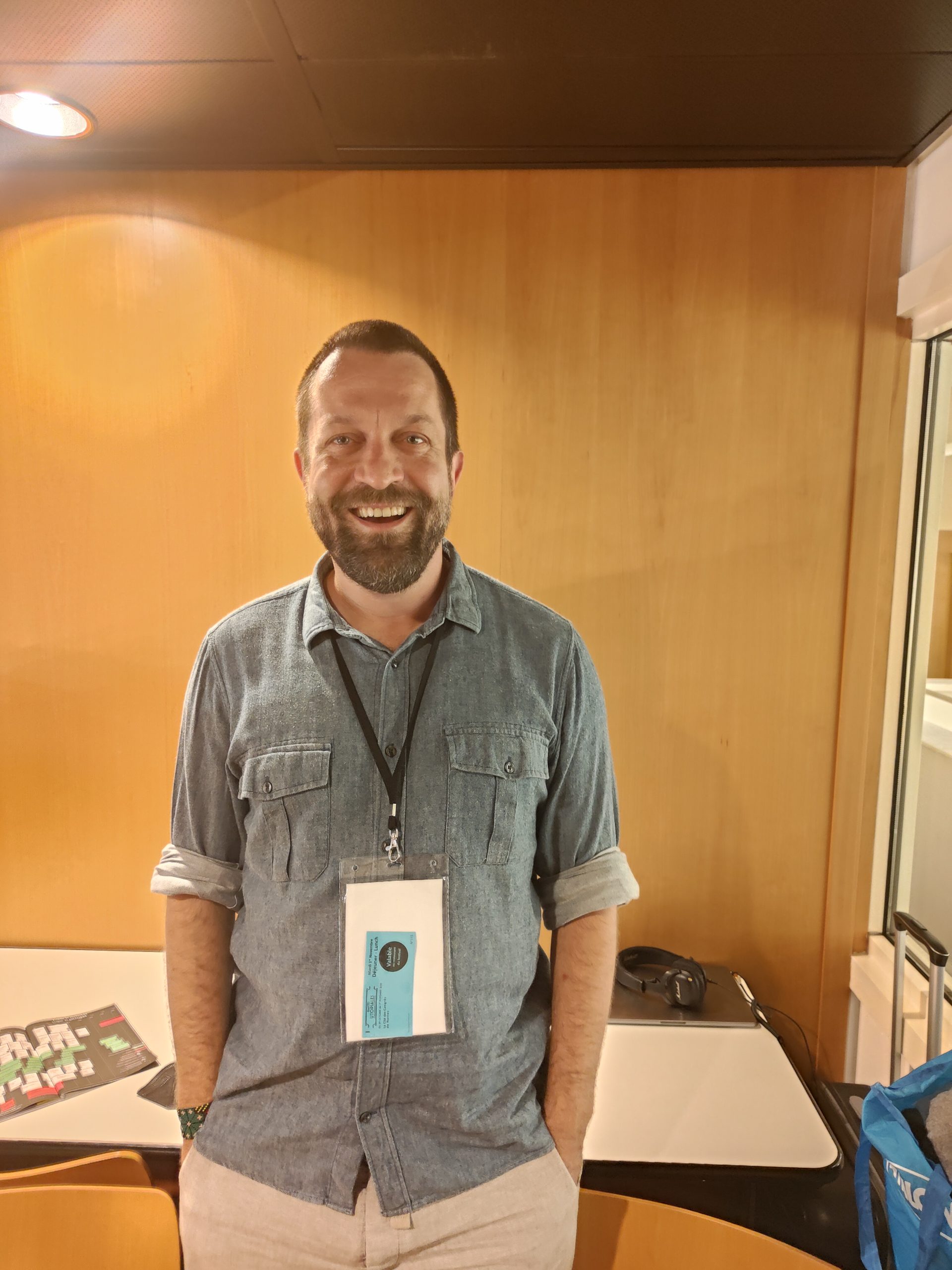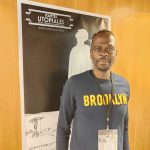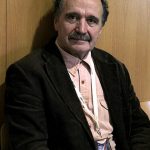Alexander Weinstein was present during Utopiales, the french festival of Science-Fiction that takes place in Nantes. During this visit, I have shared some questions with the writer, around the compilation of short stories After Yang.
A good time to discuss about the french translation and about the movie, realised by Kogonada with Colin Farrel.
You can find the interview in French HERE.
I want to ask you first, when do you decide to become a writer and how do you succeed?
I began writing when I was seven years old. My third-grade teacher asked us to write ghost stories for Halloween, and I ended up writing twenty of them! I was reading Stephen King at that point, and I realized that this was something you could do with your life: You could write stories and become an author. I didn’t yet know what that would involve. At seven, I imagined you just wrote a book, sent it off and it got published. Well, it turned out it was a little harder than that! I kept writing all through high school, went to college and then graduate school to study creative writing, and I continued to write stories and send them off in hopes of publication. Early on, it was a lot of trial and failure. You write your heart out, send off your work, and . . . you get rejected! You go through a kind of dark night of the soul. In fact, before I had my success, I had 94 rejections of my stories.
But this rejection was integral to my success as a writer, because something happened at that moment. I think until then I was trying to write stories to “impress” others. My main goal was to get published rather than focusing on the strange kind of stories I wanted to tell. And I realized, OK, well, with 94 rejections, I might as well write whatever I want. That was the moment when my writing transformed, because I gave up trying to write what I thought “might get me published” and instead I began writing these strange stories about robotic children, and people having memories implanted, and suddenly I began having success in publishing.
So really, I guess, in answer to how you succeed, a big part is believing in your own work, believing in your own voice, and allowing it to come out on the page fully. And the other secret is not to give up but to keep writing.
Before discussing the robot Yang, I want to discuss Mika, because we have an American family that decides to adopt Mika, a Chinese child at a moment when Chinese and Asiatic people are not tolerated in the USA. And I wonder if there’s something strange in our world where we decide to have children despite the futures that we propose to them. Do you talk about those people who don’t take into account the possible consequences in the future for those children?
Beneath the surface, my stories are always asking: How do we connect again? And I’m not referring to the kind of connection that we talk about now, which is join me on LinkedIn or Facebook or Instagram! No, how do we actually connect in real life? And in the case of children, I think it’s vital that we take care of this next generation and leave them a better world than we found.
It’s interesting that in this story nobody seems to be having actual children anymore. They’re not really discussing should we have our own children? In this future people either clone or they take care of displaced children from natural disasters. I think this family believes that they are doing the right moral thing. And in a way, they are. Mika was displaced by an earthquake, so they are creating a home for her. But they are also making the decision to have her raised by Yang, a robotic “Chinese” older brother that they’ve purchased. So, their attempts to do good in the world are inherently linked to a deeper disappearance into a technologically-addicted future. In many ways, they simply haven’t thought it through far enough. They haven’t considered the prejudice that Mika is going to encounter, and they haven’t considered how outsourcing parenting to a robot might cause larger problems. You could say that there’s very subtle critique here of being too “woke” yet not really being informed about the true depth of human compassion and political action.
And you have said it, there are two aspects. Either we clone our children or we have another way that is robots. And we see that there are two clans: clones versus robots. This is political in fact, and this opposition is very present in your text.
Yes, this is part of the humor in the story, because there are all these different separations between people. There’s also a separation between solar car users and electric car users, for example. The solar car users are sort of new-age elitists who critique the electric car people. The same argument is going on between people who clone their own children versus the people who adopt or purchase robotic kids. Our main character, who is on the robot side, thinks cloning-parents are a little too All-American. They just want to clone themselves and endlessly replicate their family line exactly like themselves.
I agree with the anti-cloners, by the way. I think it’s a bad idea to clone children! And yet, I’m always looking for ways to undermine my own morality or challenge my stance within a story. So, in After Yang, the anti-cloning stance of our narrator is constantly challenged. For example, he has a nice neighbor who clones his own kids.
Yes, the father sees his neighbor as an awful guy. But he’s a very human guy.
That’s me making fun of myself! Because I have this judgment of this neighbor, who our narrator describes as “a guy who paints his face for Super Bowl games.” Like that’s 100% me. I always think, oh, that’s way too much, these mindless sports fans. And then, lo and behold, people are much more complicated than our small judgements of them. As we see in this story, this guy who paints his face for sports games is simultaneously a deeply caring human. So, complicating my critique is not simply a way to challenge my own small-minded judgements, but it’s also a way to deepen my characters. Because, indeed, the neighbor is a wonderful human being, and part of the story is asking deeper questions about how easily we limit our perceptions about one another.
And meanwhile, Yang the robot is breaking. Your story is also about the family and its composition. At what moment did the robot become a member of the family?
I think subconsciously he was always part of the family. They just didn’t realize this until he breaks down. And part of that comes from his humanness and because the family spent so much time with Yang, had conversations with him, developed a relationship with him. Of course, Yang also shows evidence of being alive. For example, he tells the real living daughter “I love you” and we find out Yang has a secret life where he makes art projects—and meanwhile he wasn’t programmed to make art. There’s this moment in the story where the dad rakes leaves with Yang, and the father realizes that he feels like the robot is his son. Maybe they should have a beer together and sit and watch the sunset. And then it dawns on him that, oh, Yang’s just going to get shut down once Mika is old enough not to need him. He’s just an old iPhone that he’s going to replace.
As a Sci-Fi writer, I’m constantly trying to trick myself, and I think Yang has tricked me into falling in love with him as a “real boy.” So, my experience as the author is very much the same as the family—I’ve come to think of Yang as alive. This is very much a metaphor for how we begin to form our relationships with our technology. It’s not uncommon for people to say, “I love my iPhone!” It’s the last thing they see before they go to bed and the first thing they look at in the morning. There’s a kind of love language around technology. The moment we move into robots or Androids or anything like that, I think we’re going to lose our sense of distance from what makes something human and what makes it a machine.
We have the feeling, that the father is fighting against this humanness. In one part he treats Yang like a son, and in another part he says, it’s going to cost me $8,000 to replace him. We have a feeling that he doesn’t have the tools to define if it is his son or not.
It’s the capitalist pressure on him that’s causing him this struggle. And so his dilemma becomes very practical: Can we afford another son? Which actually, now that I say it aloud, is the kind of conversation that many people have when they think about having real children. Can we afford having another child? Especially in the States, where you don’t have any kind of financial support or state support. Then you really have to make these decisions that become purely economic rather than ones based in love. Can we afford $200,000 to send our kid to college, for example. That’s a big pressure that we see this family has. And so, on a deeper level, the story is a metaphor for our present lives, because I think we’re constantly making economic decisions around love, which is a very strange place that capitalism has put us in.
And there is something very important for you: your short story was adapted by Koganada and with Colin Farrell as the actor. What does this mean for you?
It’s a dream comes true. I’ve always loved film and when I was little, I wanted to become a film producer. Ultimately, I chose the path of a writer—but now with film and television productions of my fiction, I can see that it’s coming full circle. After the long journey as an author, I find myself starting to create film and television as well, and this has been wonderful.
As for the film, After Yang, what was really funny was when I met Yang, the actor, on the set. In that moment, it was as though the robot had come back to life! And here were all the family members from my story that were saying hello to me. So, this was a wild experience. Kogonada was wonderful to work with and he really had such incredible ideas for expanding the story. I’m a very open author when it comes to adapting work, and I embrace the idea that a filmmaker will add new material and take the story in unexpected ways. The film has about 70% new material that’s not in the story.
It was my next questions: your story is around 20 pages and you have a whole film.
Yes, that’s the brilliance of directors and screenwriters like Kogonada. They can take the heart of the story or the soul of the fictional characters and expand them outwards. I’m starting to learn this more from working in television. The way you can build from the kernel of a short story and expand the world from a single detail.
Right now we’re working on at TV series based on my story Comfort Porn. The idea of this world is that Tinder and Grinder have come so far that everybody can have sex just by choosing their partner and positions before they meet. It’s very transactional, you just choose your positions ahead of time and then you don’t even have to talk to the person you’re having sex with. Since it’s easy to have whatever kind of sex you want, the new pornography that people watch is purely emotional. It’s just people being cozy to each other. Friendship videos of people waving and saying “Hi! I’m so happy to see you!”
As creators, we look at this story and begin to ask questions like: Okay, so how did this Comfort Porn industry develop? In a short story I don’t need to cover this, but in a television show that becomes very interesting. How does the character become involved in that industry? What does it mean for the real pornographic industry? It’s like building fan-fiction from my own short stories.
Some of your short stories deal with the treatment of the memory in terms of AI. Are new technologies and their usage subjects that matter for you?
Yes, very much so. The stories in the collection all deal with near-future technology. In the story, The Cartographers, there’s an ability to implant memories so that we can have vacations that we couldn’t afford, or parents that were better than the ones we actually have, or children for the childless.
In my story, Children of the New World, people make love online through virtual bodies and then they end up with virtual children that exist only online who they have to protect from viruses and hackers because they want their online children to grow up.
My stories are always exploring this question of how easily we are adapting and merging with technology in our present lives. In many ways, they are warnings about our technological future. Very subtly I’m saying: Please, let’s not go there. How about instead of getting addicted to our technology, we focus on how to take care of our loved ones, our family, our partners, and each other in this human world.
There are several steps for me in terms of writers: be published; be adapted; be translated. What does it mean for you to be translated and how do you work with your translator?
I’m honored that the stories I tell strike universal themes that everybody can relate to. That’s very important to me as a writer because so much of my work deals with humanity and our shared emotions of falling in love, the fears and hopes we have for our children, or if we decide not to have children, the fears and hopes we have for ourselves. These are universal experiences. In fact, my second collection is called Universal Love where I explore technology and what has happened to love in the new world. So being translated has been another dream come true for me.
And the last question: you are in Utopiales. What do you feel about this?
It’s a fantastic festival! In fact, it has inspired me. Last night, I woke up from a dream and began writing a futuristic script. I credit that to being in this space, surrounded by so many creative, imaginative people. You know, everybody here is thinking about the future and about utopias and dystopias and conscious machines. It’s a brilliant thing for sci-fi and fantasy writers, readers, and thinkers. We need these kinds of conventions to bring all us wonderfully strange people together. It’s a space where creativity is both celebrated and flourishes!







